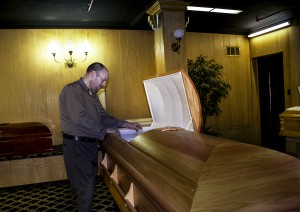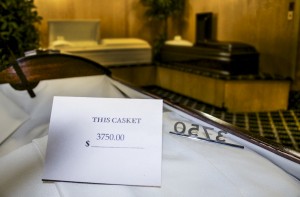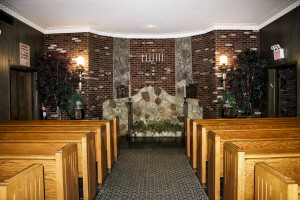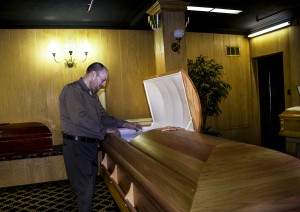People with no connection to the funeral business find it hard to fathom that business could ever be bad. After all, people keep dying. I do have a connection, though, and from a young age, through the ins and outs of my family’s funeral home, I’ve seen how uncertain business can be.
The career of a funeral director is more than a job; it is a lifestyle. It is one that calls for your availability 24 hours a day, seven days a week; death waits for no one. My parents’ first date was interrupted when my father received a call about going on a “removal” – he had to go pick up a body and bring it to our family’s funeral home. At movie theaters, my father would always sit close to the exit, just in case his phone rang and he had to speak with a grieving family.

Until around 10 years ago, people with a death in the family would generally go to their local funeral home. That guaranteed business for the funeral homes, while families could find comfort in knowing their friends and neighbors went there as well. But as communities began to change and different cultures moved in and out of neighborhoods, family-owned funeral homes suffered. Many were forced to close, collaborate or reinvent themselves, and a great many of them were acquired by large, multinational corporations.
My father, Peter Nieberg, 52, and my uncle, Stanley Nieberg, 63, own and are the directors of Nieberg Midwood Chapel in Brooklyn. They chose to reinvent their business, rather than give up on the family’s five generations of hard work. They renovated the chapel’s exterior in 2005, hired a Russian-speaker to reach out to a broader community and created advertisements that appeared on city buses whose routes ran through various Jewish neighborhoods in Brooklyn.

At one time, funeral homes catered strictly to the cultural and religious values of the neighborhoods in which they were embedded. Jews and Muslims typically have a one-day viewing followed by burial. Catholics traditionally had three-day viewings, followed by the burial. But as the recession hit in 2007-08, many families began cutting visiting down to two days, and now a majority have only one.
Funeral directors take honor in the business that’s granted them. It’s a sense of trust and reliance that clients leave in the hands of the director to take care of their loved ones. That said, many people don’t realize that it doesn’t matter to which religion a funeral home caters; funeral directors do not turn away clients because of religious affiliations.
Though my funeral home caters to the Jewish community, my Catholic maternal grandmother turned to my father when my grandfather died. My father was able to do the job and honor Catholic funeral traditions by renting LaBella Funeral Home in Bensonhurst.
In yuppie neighborhoods, in particular, funeral homes have lost considerable business to the growing preference for cremation.
The use of cremation is projected to surpass that of burial in 2015, according to a report published in October 2014 by the National Funeral Directors Association. Among the reasons that traditional burials are declining, the organization says, are “decreased household discretionary income, environmental concerns, fewer religious prohibitions of the practice, a growing preference for simpler, and less ritualized funeral ceremonies.”
The numbers make clear how damaging that change of heart can be to funeral homes. Funerals can cost around $7,000, the exact number determined by the family’s preferences: how many days the body will be laid out, the type of casket and the headstone they prefer, among other cost factors.

That doesn’t include the cemetery charges. Cremation, on the other hand, costs around $3,000, with no additional charges or maintenance fees at the end of the year.
Working for different homes and doing the work that comes your way is what many funeral directors must do to survive.
Bobby Kull, a New York State funeral director licensed for more than 35 years, has lived in Brooklyn his whole life and works in a variety of funeral homes. He has seen the struggle among not just business owners, but individual directors who compete with large corporations like Service Corporation International.
SCI, the largest player in the funeral industry, has in recent years acquired its two largest competitors, Alderwoods and Stewart Enterprises. It also owns the National Cremation Service brand, the Neptune Society and Advantage Funeral and Cremation Services. SCI has more than $2 billion in annual revenue, and operates in 43 states, 8 Canadian provinces and parts of Germany. Wall Street analysts who follow the company expect its growth to continue, further challenging small, independent funeral homes.
SCI is one of the corporations run by “number-crunching accountants,” said Kull, “charging almost double of what your local funeral home charges for the same services.”
In another discouraging development against independent funeral homes, in October 2009, Walmart helped begin the trend of selling caskets and urns online. It offers free shipping and customizable products. All you Yankees fan out there can pre-order a casket embossed with the team logo and, of course, a white-velvet interior with navy blue pinstripes.
And a funeral director’s take on all this? “If it’s a price war, no one gets out alive,” as my father always says.
He argues that the challenges that funeral directors face are unique.
“Do you go to the repairman with new brakes and say, ‘Here, put these in,’ or do you go to the diner with raw eggs and bacon and tell the chef, ‘Here, cook this?’ so why is it fair to this business?” he asks.
I find myself, years after being so deeply immersed in the family business, with an immense collection of black “funeral dresses” to go to work in, torn that I could be walking away from the opportunity to be the sixth-generation of an empire I would continuously have to reinvent.
Originally published in Baruch College’s Dollars & Sense http://blogs.baruch.cuny.edu/






